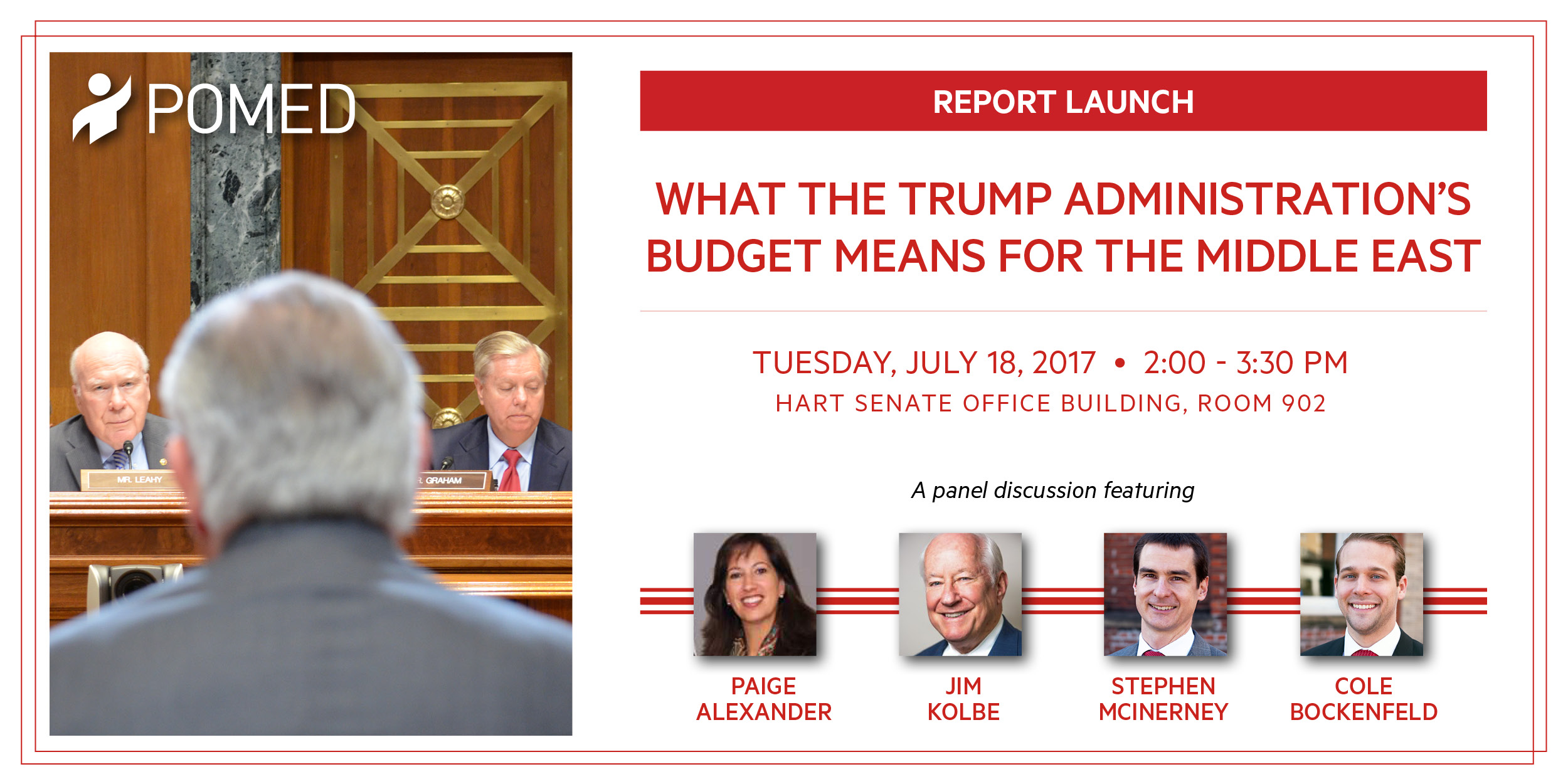Location: Hart Senate Office Building, Room 902
A discussion with:
Paige Alexander
Former Assistant Administrator, USAID,
Bureau for the Middle East
Jim Kolbe
Senior Transatlantic Fellow, German Marshall Fund
Former Member of the House of Representatives
Stephen McInerney
Executive Director, Project on Middle East Democracy (POMED)
Cole Bockenfeld
Deputy Director for Policy, Project on Middle East Democracy (POMED)
On July 18, 2017, POMED launched its annual report, “The Foreign Affairs Budget: Democracy, Governance, and Human Rights in the Middle East and North Africa.” The following is a summary of the discussion.
PANELIST REMARKS
Stephen McInerney: Each year, we write this report analyzing the annual budget request and appropriations process, but this year that process was more challenging than usual for several reasons. First, the budget request that was submitted to Congress contains much less detail than usual – this year the Congressional Budget Justification narrative that for international affairs is about half as long as in previous years. Many sections are omitted, including a narrative section for each country that is a recipient of bilateral foreign aid from the United States.
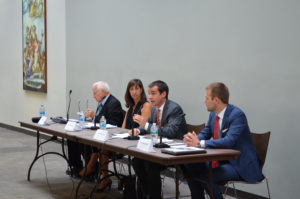
In our discussions with administration officials, there is also less clarity in terms of strategic vision for assistance than there was in the past. This is partly because of the transition to a new administration this year, resulting in many empty positions at the State Department and USAID. In addition, the State Department is currently undertaking a comprehensive review that should result in recommendations for reorganizing the State Department and USAID. Until this process is completed, it leaves a vacuum in terms of strategy.
The administration’s budget proposes a cut of about 30 percent for all foreign affairs, including foreign assistance. The international affairs budget globally for FY18 is $40.2 billion, down from $57.5 billion currently in FY17. Many people we spoke with were frustrated, feeling that the internal review should be completed before such large budget cuts are proposed. If enacted by Congress, the proposed budget cuts could dramatically influence the U.S. foreign policy apparatus before the comprehensive review is even complete.
Spending is cut by 12 percent in the top line budget for the Middle East and North Africa (MENA). Government officials have said MENA is a top priority for this administration and that the budget reflects this. MENA does have a larger budget than any other region, and its budget is cut less than that of any other region. But the topline number is misleading. The overwhelming majority of aid is to the 3 largest recipients of aid- Israel, Egypt, and Jordan. They are essentially exempt from cuts. However, bilateral aid to Iraq, Lebanon, Morocco, Syria, Tunisia, and West Bank/Gaza is cut significantly. For each of these countries, the cut is between 20 percent and 67 percent.
The budget request also proposes large cuts to democracy and governance accounts and initiatives. The State Department Bureau of Democracy Human Rights and Labor’s current budget is $145 million, but the FY18 budget requests only $50 million. For the Middle East Partnership Initiative (MEPI) the budget is only $25 million, a 58 percent cut from the current level of $60 million. Only $15 million is requested for the Near East Regional Democracy program, half of its current budget of $30 million.
 This budget also appears to to accelerate a trend of increasing militarization of the U.S. relationships with the MENA region, including foreign aid to the region. A year ago we noted in this report a consistent trend throughout the Obama administration – that a gradually higher percentage of the MENA budget is allocated to military and security assistance. In this year’s budget, that trend is accelerated, with 80 percent of the aid for the MENA region allocated for military and security assistance – if passed by Congress, this would be the highest percentage to date. And this growing percentage is of the aid allocated through the State Department in the Function 150 account, in addition to a growing level of security assistance allocated through the Department of Defense budget.
This budget also appears to to accelerate a trend of increasing militarization of the U.S. relationships with the MENA region, including foreign aid to the region. A year ago we noted in this report a consistent trend throughout the Obama administration – that a gradually higher percentage of the MENA budget is allocated to military and security assistance. In this year’s budget, that trend is accelerated, with 80 percent of the aid for the MENA region allocated for military and security assistance – if passed by Congress, this would be the highest percentage to date. And this growing percentage is of the aid allocated through the State Department in the Function 150 account, in addition to a growing level of security assistance allocated through the Department of Defense budget.
There is also a proposal to convert FMF from grants to loans for all but 4 countries in the world – Israel, Jordan, Egypt, and Pakistan. This would eliminate FMF grants to many foreign allies, including numerous MENA countries. This would likely result in many countries turning to DOD-administered security assistance rather than relying on loans, which could further accelerate this trend of militarization.
One other note – we wrote this report prior to last week’s committee markup in the House, so the report does not include analysis of the House bill, although we’ll be glad to include some of the House numbers in our discussion today.
Cole Bockenfeld: One striking part of the budget proposal is that it aims to maintain Egypt’s aid package more or less “as is,” despite the fact that Egypt’s aid package is widely regarded as outdated and in need of change and modernization. Egypt is one of the very few countries for which a significant cut in aid is not proposed, and it’s also one of only four countries globally exempted from the proposed change of FMF from grants to loans. The administration does propose to reduce economic aid down to $75 million – down from the current level of $112.5 million. Part of the reason for this proposed cut is the existing backlog of approximately $400 million in unspent economic assistance from previous years.
President al-Sisi ratified a repressive, draconian NGO law just over a month ago, which could make implementation of U.S. economic aid programs impossible. This law has drawn lots of criticism, including from many key members of Congress, and has prompted calls for full review of economic assistance to Egypt, one of the longest running U.S. aid programs in the world. In response to the law there are many options under consideration:
- Close USAID mission in Cairo – one of the oldest, largest USAID missions in the world
- Only focus on education and scholarship programs in Egypt
- Reprogram parts of Egypt’s backlogged economic aid to other countries
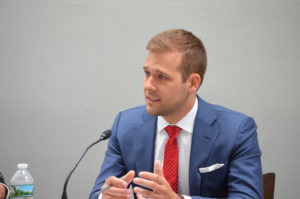
USAID can’t expect to have a widespread development impact in the absence of cooperation from the Egyptian government.
When Obama resumed aid to Egypt in 2015 he implemented a few reforms to the FMF package. The administration introduced four categories that Egypt’s new purchases would have to fall under: maritime security, border security, counterterrorism, and the Sinai. He also announced the phasing out by FY18 of cash flow financing, which has allowed Egypt to sign large, multi-year defense contracts, committing much of their FMF allowance years in advance, which has impeded any efforts to change or modernize the aid package.
Now that cash flow financing has been discontinued, the administration has paid down those outstanding balances. For the first time in history, there is enough money in Egypt’s military account to pay out all outstanding payments. For the first time, Congress is not obligated to pay FMF at or above the previous year’s levels to meet payment schedules. This should allows appropriator to begin a long-overdue comprehensive overhaul of Egypt’s FMF.
We propose 5 ways to change the military aid package to Egypt:
- Congress should reduce the level of FMF from $1.3 billion
- Congress should preemptively prohibit the reinstatement of cash flow financing
- Congress should strengthen democracy and human rights conditions in the law, including by requiring Egypt to drop its newly ratified repressive NGO law and drop case 173 targeting civil society.
- Congress should increase the percentage of FMF tied to these conditions..
- Congress should not provide a national security waiver, which has been routinely used by successive Secretaries of State to essentially render the conditions meaningless.
The Hill has a real opportunity to overhaul the FMF package in a way that’s been needed for many years. The same could also be done with economic aid – modernize the ESF package in line with the current realities, including what is possible and what is not under the new NGO law.
One of the new sections in this year’s report is coverage of humanitarian aid. There are more than 32 million refugees and IDPs that depend on humanitarian aid. The account for Migration and Refugee Assistance (MRA) has been cut by 18%. There is a proposal to merge Food for Peace with International Disaster Assistance (IDA), and to cut that cumulatively by 30 percent. Congress needs to protect these accounts – humanitarian needs aren’t going away.
There’s been a trend of increasing support to Tunisia since the revolution. This year, the budget requests only $54.6 million for Tunisia – a 67% cut from the current level of $165.4 million, and the deepest cut proposed for any MENA country. Tunisia is the Arab world’s sole emerging democracy. The budget zeroes out Tunisia’s FMF grant, halves its economic assistance. U.S. investment in Tunisia has had strong returns over the last two years, and modest levels of aid can have a real impact at a key moment in this small yet critically important country. We need to double down on Tunisia, not back off.
The Senate should follow the House’s lead, as it renewed aid to Tunisia at $165 million in its bill last week. Senator McCain recently gave a speech at the Heritage Foundation and eloquently noted that if the administration is committed to counterterrorism, there is no greater response to the cycle of violence and radicalization in the region than to support Tunisia’s continued democratization. We feel like Tunisia deserves support and needs continued assistance.
Paige Alexander: The deep skepticism that this budget shows toward foreign aid is felt not only here in DC, but also abroad. I’m now based in Europe, and there is much discussion among our European allies on the impact of such budget cuts. I will highlight three main impacts:
-
Political impact
Our “America First” agenda allows figures like al-Sisi to “put Egypt first” – to justify actions like the ratification of the new NGO law or targeting dissent in the name of national security. 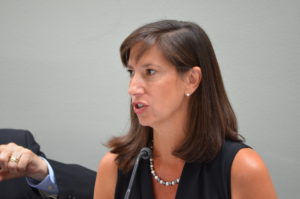
Funding impact
Congress has had a swift reaction to the budget, with bipartisan support for the importance of civilian tools in foreign aid. But there’s concern that despite Congressional voices in favor of maintaining funding, the administration could erode institutions through reorganization, even over the objections of Congress, and that budget fights could result in a government shutdown.-
Adaptation
When support for NGOs is closely tied to national security interests, this can push NGOs to adapt their work to fit a national security framework to satisfy the donors rather than focusing on the genuine democracy rights and governance work that is needed locally.
FY16 funds expire September 30th and no congressional notification has been sent on FY16 expenditures for Egypt. This time last year the government $100 million of FY15 funds were reprogrammed to Syria and other countries because we couldn’t reach an agreement with the Egyptian Government on how to use ESF funds. Currently, there is $140 million sitting on Egypt that has not been notified. If we skip two years of economic assistance funding to Egypt this will beg the question as to whether the AID mission should remain in Cairo. Two years without funding for Egypt sends a strong message. It tells the Egyptian government that we’re ok with giving you FMF, but we won’t put on the democracy or decentralization programs that you don’t want and that you obstruct. It tells them we’re not interested in supporting civil society.
Jim Kolbe: The budget is curious in its willingness to overlook repression and lack of democracy in countries like Egypt. Of course, this was also never really a priority in the Obama administration, and the Trump administration appears to be accelerating that trend. It’s troubling when countries that turn away from democracy continue to receive so much military and security aid.
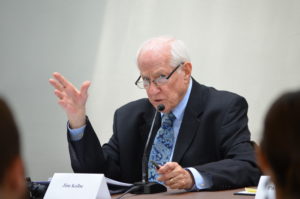 Tunisia is the one country doing relatively well in moving toward democracy. But with a 67 percent cut in proposed aid to Tunisia, what is the signal we are sending to countries around the world? In general, democracy has been sliding backwards globally over the past 8 years. Cutting aid to a country who is struggling to be a democracy and rewarding countries going in the opposite direction sends exactly the wrong signal.
Tunisia is the one country doing relatively well in moving toward democracy. But with a 67 percent cut in proposed aid to Tunisia, what is the signal we are sending to countries around the world? In general, democracy has been sliding backwards globally over the past 8 years. Cutting aid to a country who is struggling to be a democracy and rewarding countries going in the opposite direction sends exactly the wrong signal.
Increasing militarization is another disturbing trend. Security assistance grants are supplemented with even more FMS, and more programs are being run through the Department of Defense.
Secretary Tillerson said before Congress that the State Department and USAID have not evolved to meet challenges in world today. There should be concern with tying short term policy imperatives to reorganization. If you fold USAID into the State Department, you would lose ability to take longer term look at how development is taking place in different countries.
Congress has asked for four things to be made clear prior to any reorganization:
- Impact on personnel
- What is the process used to determine the reorganization of operating units
- Impact on ability to do monitoring and oversight of programs in countries
- Impact on national security
QUESTION
What can we take away regarding the administration’s approach to Syria from this budget?
Bockenfeld
The most important accounts related to Syria are multi-country humanitarian accounts that address the crisis in Syria. We found frustration with the gap in assistance to Syria more broadly with the lack of a clear policy, which is not new to the Trump administration. The dynamics on the ground are rapidly changing, and the assistance and programming have not adapted sufficiently. The administration may be more willing to use force to retake territory, but it remains plagued by the lack of a clear broader strategy, and the assistance reflects that.
Kolbe
Syria is a classic example of a completely failed state – It will be with us for years and will require transfusions of emergency assistance. I don’t see any stable government in the near future.
Alexander
Development is supposed to be linear – you start with humanitarian aid, move to transitional and construction aid, and then move to long term development. Syria is a paradigm of a completely collapsed state. There’s a paucity of Syrian partners – it’s hard to find pockets of opportunity to work to capacity in the country.
QUESTION
Can you clarify whether in security and counterterrorism cooperation there are other activities that would skew activity even more in the military vs. civilian direction?
McInerney
In each individual country section of our report, we focus primarily on the bilateral assistance for each country, but we do also try to touch on which other, multi-country accounts might be drawn on. Our report does not get into Department of Defense funds except in a few places, as DOD funds are not specified by country or in the same level of detail, and those funds do include some funds specifically designated for counterterrorism.
Bockenfeld
The Department of Defense-managed security assistance accounts have increased from $8.5 billion in FY14 to $11.2 billion in FY18, while State Department accounts have decreased from $8.6 billion to $7.1 billion.
The National Defense Authorization Act (NDAA) expanded the scope of activities that the Department of Defense could cover under Section 333. These activities are training for countering WMDs, illicit drug operations, organized crime, maritime and border security, military intelligence. Maritime and border security are two of Egypt’s four categories. Who’s to say the Department of Defense might not take those over? If the Department of Defense takes on those accounts how might that further militarize our relationship with Egypt?
Alexander
There’s much more cross-fertilization between Department of Defense and the State Department than in the past, which is a good thing. I agree that militarization has been underway for many years. It’s important that the State Department and USAID be able to speak the Department of Defense’s language, so we don’t work at cross purposes like we did in Balkans and other places in the 1990s.
QUESTION
Can you talk about what messages are being sent to other donors – are they stepping in to fill the breach left by this budget?
Alexander
Europeans are trying to fill the U.S. funding gap. The question is whether other private funders can support Tunisia, in Europe’s backyard? They need to be there in a larger way. It’s difficult because the Middle East is seen as a big drain on potential funding streams. There were only 9 countries with over $100,000 dedicated to creating space for civil society in last year’s budget. If missions with USAID get closed, a private funder can come in and fill gaps and give more than U.S. Keeping the Europeans on board is very important.
McInerney
We’ve often found that when U.S. is willing to press countries on human rights, European countries do the same. The U.S. has more leverage with these countries because of our close security cooperation and large military aid and weapons sales. If this administration shows skepticism toward the U.S. role for democratic values, it will be more difficult for Europeans.
QUESTION
When AUSAID rolled into the region, it initially brought tremendous amounts of money in democracy development and human rights work, but then it dried up overnight with political changes in Australia. Has Australian reform been considered in what’s being proposed here?
Alexander
I’m not close to AUSAID and I don’t know what will happen. But that’s why it’s important to reach out beyond America and talk to other funders. I can’t answer on AUSAID in particular.
McInerney
The cuts we see proposed here may be similar to what you describe as happening in Australia. We have to see how Congress will respond. We could see some U.S. government-funded programs come to a screeching halt as soon as next year. And uncertainty about cuts has already had a huge effect in the way programming is carried out now. Fear of oncoming cuts has made agencies more conservative with existing funds. There’s fear to spend down funds too quickly out of fear of enormous cuts to come in the following year.
Bockenfeld
Personnel and policy are also affected. There are still many senior level vacancies in the State Department. That has limited things and created uncertainty. And all of this is before the results of the assessment on reorganization.
QUESTION
To what extent can Congress play a role in the State Department’s reorganization?
Kolbe
They can play a role – they can tell them no – but I don’t know how much of that they’ll do. The administration can take some steps alone but they should be wary of pushback from congress.
Bockenfeld
There was a hearing yesterday at 5 in the Senate Foreign Relations Committee on the State Department reorganization process. Chairman Corker spoke about special envoys to the State Department. There are 68 special envoys – seven were created by congress with permissive language, eleven were congressionally mandated, and the rest are under purview of State Department. Corker said that the State Department should eliminate them. The DRL was created and authorized by Congress. Any attempt to change it would require that you’d have to go back to Congress and amend the authorities. Other places don’t have the same level of protection. Congress can block changes in some areas but in most places changes can be made unilaterally.
McInerney
Many in Congress feel they have less leverage when the State Department effectively wants to shrink itself and reduce its own budget. Congress is used exerting influence and oversight over the State Department and USAID by potentially threatening budget cuts, but now those cuts are coming from the Secretary of State, so Congress is unsure how to get answers from him.
Alexander
The Middle East Partnership Initiative (MEPI) is not legislatively mandated or approved. MEPI was created as an alternative to the USAID Middle East bureau 9 years ago. Congress can’t get involved in MEPI or other, similar coordinating bodies. Some parts of the reorganization can largely be done without Congress’s approval, which is somewhat worrisome.
QUESTION
It seems like reconstruction efforts in Iraq could be one of the easiest and fastest ways to curry favor, and future projects won’t be successful if people don’t have homes and roads to use. Can you elaborate on grand strategy for the next 1-5 years in northern Iraq?
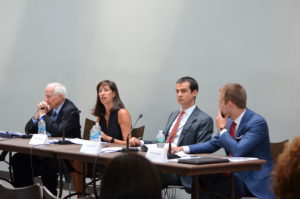
Alexander
Easiest and fastest often isn’t the best development paradigm. If there’s not decentralization coming from the Iraqi government, and no power and budgeting authority in hands of people getting aid, there’s a mismatch. There’s also a security issue – AID can’t put implementers in harm’s way. This limits the ability to get outside the green zone. Some money goes through the United Nations Development Programme. We have to pool our funds because we can’t keep our eyes on everything. It is going to have to be recovery and stabilization but not reconstruction because it’s simply too costly. There are good civil society groups in Iraq who can pick up where we leave off once given the power. We have to ask: where are we putting our money and how will we be most effective?
QUESTION
What does this budget tell you about the Trump administration’s big ideas for the Middle East and North Africa? What does it tell you about Tunisia? Do you think Youssef Chahed, Head of the Government in Tunisia, was well received here in Washington last week? Did he convince them to change their mind on the budget?
McInerney
What do the budget and lack of narrative description tell us? It tells us that a strategy is not in place yet – and many officials acknowledge that. At the same time there’s a desire to cut budgets. Many people believe that the administration should figure out its strategy before proposing massive budget cuts – it could end up that congress forces something like that to happen. I don’t think the administration cut Tunisia consciously because they don’t want to support them. The budget is coming from the White House to satisfy big top line cuts they want to make. There are some countries with political influence whose aid is protected. The budget started with the big picture and topline cuts, which results in cuts in unprotected places like Tunisia. The longer an aid package has existed, the harder it is to cut for a variety of reasons. It’s the most longstanding recipients of foreign aid that have been exempted from cuts.
Bockenfeld
The PM’s visit did garner attention and support that was much needed for Tunisia. In general, bipartisan support for Tunisia on the Hill has grown steadily for several years. This is reflected in the Senate resolution and in comments from senior members in Congress saying Tunisia is a priority. We should be encouraged by the House bill that’s come out. The House rejected proposed changes and fulfilled the full FY17 number. Then there’s Senator McCain’s speech at Heritage, where he said the cuts will not happen. He cannot guarantee that of course, but he is very close to Senator Graham, who’s as close to a guarantee as you can get.
QUESTION
One of the things we’re excited about is the Senate vote to block sale of PGMs (Precision-Guided Munitions) to Saudi Arabia. How much of an indicator do you think that might be of this Congress’s willingness to say “No, human rights will be a priority. No, we are not solely going to base our relationship with the middle East on military expenditures.”
Bockenfeld
This PGM vote was a big deal. It’s not covered in this report because the arms are purchased through FMS, and therefore are not in the U.S. budget. The level of opposition has substantially grown, as a result of discomfort with the war in Yemen and attacks on civilian targets. I think the Senate is trying to signal a desire to see the war in Yemen come to an end. This should be a top priority for Secretary Tillerson, and we should see real diplomatic attention from him.
Alexander
Stuart Jones, the acting Assistant Secretary of State for the Near East Bureau, said in testimony “this administration has de-linked human rights and security issues.” He was answering a question on Bahrain, but if this is actually the administration’s position, that’s very unfortunate.
McInerney
We see a lot of bipartisan interest on the Hill to see the U.S. continue to support democratic values. It takes more than expressed opinions of course. Congress’s role will be very important. As we’ve outlined in this report, the administration is skeptical of connections between human rights and democracy and U.S. national security interests.

